Index relies entirely on the support of donors and readers to do its work.
Help us keep amplifying censored voices today.
The anti-terror charges against reporters for Vice News in Turkey are not isolated. In recent years, a number of countries have used broad anti-terror laws to restrict the freedom of the press.
Turkey
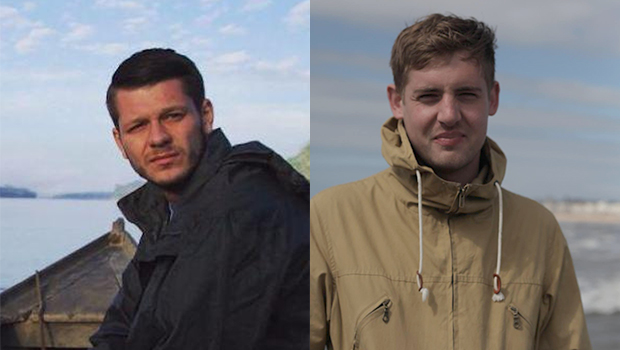
British journalists Jake Hanrahan, left, and Philip Pendlebury and Iraqi translator and journalist Mohammed Ismael Rasool were filming clashes between pro-Kurdish youths and security forces, according to Vice. (Photos: Vice News)
Two British journalists and a local fixer working for Vice News were charged on Monday 31 August in Turkey with “working on behalf of a terrorist organisation”. They will remain in detention until their trial, the date of which has not yet been announced.
The journalists Jake Hanrahan, Philip Pendlebury and Iraqi translator and journalist Mohammed Ismael Rasool were filming clashes between security forces and youth members of the Kurdistan Workers’ Party (PKK) in the south-eastern city of Diyarbakir on Thursday when they were arrested.
Turkey’s broad definition of terrorism means that any journalist reporting on PKK activities or Kurdish rights can be charged with the offence of making “terrorist propaganda” and jailed.
Index on Censorship Chief Executive Jodie Ginsberg said: “Coming just days after the unjust sentencing of three Al Jazeera journalists in Egypt, these latest detentions of journalists simply for doing their jobs underlines the way in which governments everywhere can use terror legislation to prevent the media from operating.”
Egypt
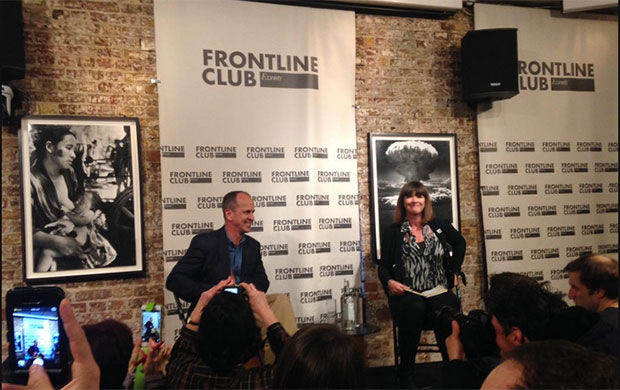
Peter Greste spoke to a Frontline Club audience about his arrest and detention in Egypt. (Photo: Milana Knezevic / Index on Censorship)
Egypt remains a cause for concern when it comes to press freedom: on 29 August 2015 Al Jazeera journalists Mohamed Fahmy, Peter Greste and Baher Mohamed were sentenced to three years in prison. The journalists were found guilty of of “broadcasting false information” and “aiding a terrorist organisation” – a reference to the Muslim Brotherhood.
The sentencing came just weeks after President Abdel Fattah el-Sisi’s government passed an anti-terror law setting a fine of up to 500,000 Egyptian pounds (£41,600) for journalists who stray from government statements or spread “false” reports on attacks or security operations against armed fighters.
Jordan
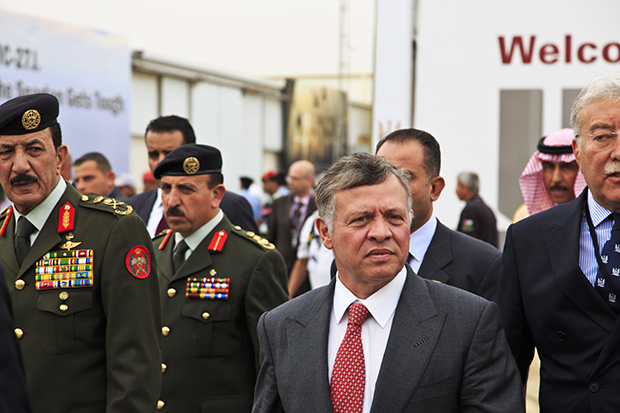
Abdullah II of Jordan at a conference in Amman in 2013. Ahmad A Atwah / Shutterstock.com
Jordan introduced a new “anti-terror” law in 2006 prohibiting, among other things, the engagement in “acts that expose the kingdom to risk of hostile acts, disturb its relations with a foreign state, or expose Jordanians to acts of retaliation against them or their money”. The charge carries a prison sentence of three to 20 years. The law was amended in 2014 to , broaden the definition of terrorism.
Interpretation of the law has been varied. According to the Committee to Protect Journalists (CPJ), in April 2015 a journalist was jailed for criticising the Saudi-led bombing of Houthi forces in Yemen. Another journalist was detained in July 2015 for breaking a recent ban on coverage of a terror plot. Earlier in 2015, an activist who criticised the royal family’s support of Charlie Hebdo on Facebook was sentenced to five months in jail under the anti-terror law.
Tunisia
One month after June’s terrorist attack on Sousse beach killing 38 tourists, for which ISIS claimed responsibility, Tunisia approved new anti-terror legislation.
Under the legislation, website editor Nour Edine Mbarki was charged in connection with publishing a photograph of a car that purportedly transported a gunman behind the beach attack. According to the CPJ, he was charged under Article 18 of the law with “complicity in a terrorist attack and facilitating the escape of terrorists,” which carries a prison term of between five and 12 years. He is currently awaiting a trial date.
Human Rights Watch said the new anti-terror bill “would open the way to prosecuting political dissent as terrorism, give judges overly broad powers, and curtail lawyers’ ability to provide an effective defence”.
Pakistan
Rights groups have long criticised Pakistan’s notorious anti-blasphemy laws for their effect on freedom of expression in the country. But strengthened anti terror legislation is also impacting the way journalists operate in the country.
In June, three Pakistani journalists were charged under the Anti-Terrorism Act, reportedly for covering the activities of a dissident politician, according to the Pakistan Press Foundation. A year before, a TV anchor was also charged under the law.
One to watch: Kenya
Following two separate attacks by al-Shabab militants in December, Kenya’s President Uhuru Kenyatta signed into law a new security bill that could curtail press freedom. Under the new law, journalists could face up to three years in jail if their reports “undermine investigations or security operations relating to terrorism” – or even if they published images of “terror victims” without police permission.
This hasn’t come into play yet – in February, the Kenyan High Court threw out several clauses, including those that could impact media freedom. The government has said it would consider lodging an appeal.
This post was written by Emily Wight for Index on Censorship
This article was posted on 1 September 2015 at indexoncensorship.org
Much of Index on Censorship’s global work involves allowing censored journalists an outlet to publish articles which may be unpublished in their home countries. This reading list, focusing on journalism, looks at issues surrounding freedom of expression and press freedom. It includes articles from Professor Emily Bell on the tools moving journalism forward and Professor Richard Sambrook’s reflection on the murders of journalists around the world that go unnoticed.
Students and academics can browse the Index magazine archive in thousands of university libraries via Sage Journals.
Journalism and censorship articles
Explosion of independent journalism by Stefan Bratkowski
Stefan Bratkowski, April 1987; vol. 16, 4: pp. 17-18
A message from Warsaw to the London censorship conference from a dissident
Back to the future by Iona Craig
Iona Craig, September 2014; vol. 43 , 3: pp. 8-12
Award-winning foreign correspondent Iona Craig discusses the growing need for journalist in war zones to go back to old ways of ignoring surveillance
The spirit of journalism by Ocak Isik Yurtcu
Ocak Isik Yurtcu, March 1997; vol. 26, 2: pp. 99-103
An imprisoned Turkish journalist, serving 15 years for anti-terror charges, discusses his experiences
Generation Why by Ian Hargreaves
In Index’s special report on the future of journalism, Ian Hargreaves considers whether the next generation of journalists will work with the public to hold the powerful to account
Users + Tools = Journalism by Emily Bell
Emily Bell, November 2007; vol. 36, 4: pp. 100-104
The Guardian’s Emily Bell on how technology is shaping the future of news and what editors need to do to adapt
Will Gore, September 2014; vol. 43, 3: pp. 51-54
Another one from the special report on journalism, The Independent’s Will Gore looks at journalistic innovation
Ahlam Mohsen, Katharina Frick, Luca Rovinalti, Athandiwe Saba, Bhanuj Kappal, September 2014; vol. 43, 3: pp. 18-19
Five young journalists, from Yemen, South Africa, Germany, India and the Czech Republic, share their hopes for the profession
In quest of journalism by Jay Rosen
Jay Rosen, May 1997; vol. 26, 3: pp. 81-89
Michael Foley interviews New York University’s professor of journalism, Jay Rosen
Attack on ambition by Dina Meza
Dina Meza, September 2014; vol. 43, 3: pp. 30-33
Human rights campaigner and Index on Censorship Freedom of Expression Award’s nominee Dina Meza talks about the situation in Honduras where young journalists are entering a profession rife with corruption and fear
Journalists are dying every day by Richard Sambrook
Richard Sambrook, March 2015; vol. 44, 1: pp. 101-102
Professor Richard Sambrook delivers a morbid account of how the deaths of journalists around the world are going unnoticed
The reading list for journalism and censorship can be found here
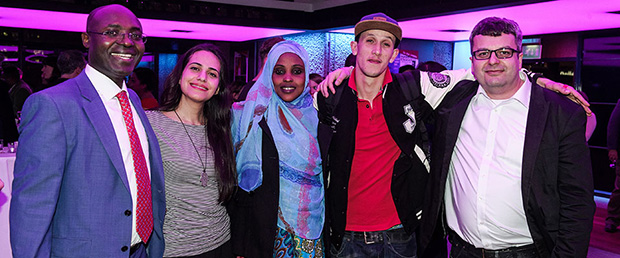
Rafael Marques de Morais, Safa Al Ahmad, Amran Abdundi, Mouad “El Haqed” Belghouat and Tamas Bodokuy (Photo: Alex Brenner for Index on Censorship)
A Kenyan woman standing up for women’s rights in one of the world’s most dangerous regions. A Hungarian journalist and his investigative news site. A documentary filmmaker who exposed an unreported uprising in Saudi Arabia. An Angolan journalist who has been repeatedly prosecuted for his work uncovering government and industry corruption. A Moroccan rapper whose music tackles widespread poverty and endemic government corruption.
These were the five individuals named Index on Censorship Freedom of Expression Award winners on 18 March 2015. Three months later, here are updates on their ongoing work.
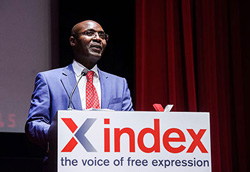
Rafael Marques de Morais (Photo: Alex Brenner for Index on Censorship)
International signatories, from Tiffany & Co and Leber Jewellers to Oscar-winning film director Steve McQueen, and from Blood Diamond film stars David Harewood and Michael Sheen to journalist Sir Harold Evans, recently called on Angolan president José Eduardo dos Santos to abandon the prosecution of investigative journalist Rafael Marques de Morais.
The campaigning journalist returned from collecting his award in London to face trial linked to his book Blood Diamonds. He filed a criminal complaint against a group of generals who he held morally responsible for human rights abuses he uncovered within the country’s diamond trade. For this, they filed a series of libel suits against him in Angola and Portugal.
The media attention that Marques won off the back of his award “helped a great deal” he said. “It raised my profile in the days before my trial and maybe helped to make it an international cause.” In a rare sight for Angola, a number of anti-corruption protesters publicly gathered outside of the Luanda courthouse as his trial opened and covert protests have continued under the cover of darkness since.
Marques’ trial played out in a Kafkaesque way over the subsequent weeks, with behind-the-scenes negotiations leading to criminal defamation charges first being dropped, only for him to suddenly discover that he would instead be sentenced for the alternative crime of malicious prosecution.
The American Bar Association, who monitored the trial throughout, published a report stating that the court had failed to meet international fair trial standards on at least three counts. The ABA Center for Human Rights report found that “throughout the proceedings, the defendant was denied the right to present a defense, induced to make a statement on the basis of false pretenses and compelled to bear the burden of proving his innocence, all in violation of international law.”
Marques’ sentence finally came down on 25 May: six-months imprisonment, suspended for a term of two years. Marques is now appealing against this punishment that effectively seeks to silence him until 2017; coincidentally the same year as Angola’s next elections.
The court also attempted to censor Marques’ book from republication and further distribution but these efforts have blatantly failed with copies of the book widely circulated online and an English language version becoming available for the first time less than a week after his sentence.
Despite the international attention, the situation for Marques and his peers in Angola’s human rights and journalism communities remains grim. Recounting the experience of taking his car to the local garage for repairs recently, the fear is palpable in his voice. “There were two members of the ruling party there, by coincidence. They walked across to the mechanic and warned him not to fix my car unless he wanted to risk becoming collateral damage.”
Marques’ email has also recently been repeatedly hacked and his website www.makaangola.org is presently subject to over 250 attacks per day, forcing him to desist from updating it for the time being.
Marques continues to work closely with Index on Censorship and a number of other international organisations. His recent report on the massacre of a sect at Mount Sumi was published by The Guardian, he continues to keep a close eye on both the persecution of journalists and corruption at the highest levels in Angola, and he is expecting to hear back from the Supreme Court about his appeal in the next few weeks.
Hugely grateful for the support of the international community, Marques remains determined “to continue the good fight for change”.
“I have only the interests of my people at heart,” he says, “and to experience all this persecution, it must mean you are doing something positive, something right.”
• Blood Diamonds: Corruption and Torture in Angola
• MakaAngola.org
• Philip Pullman, Jimmy Wales, and Steve McQueen join call for Angola to drop charges against investigative journalist
• Angolan journalist Rafael Marques de Morais receives six-month suspended sentence
• Rafael Marques de Morais: “They can lock me up, but they don’t get to silence me”
• Index condemns decision to move for conviction of Rafael Marques de Morais
• Rafael Marques de Morais: I believe in the power of solidarity
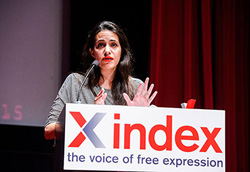
Safa Al Ahmad (Photo: Alex Brenner for Index on Censorship)
Joint winner of the Index on Censorship Freedom of Expression Award for Journalism, Safa Al Ahmad has spent much of the past three months in the editing studio.
Applauded for her documentary Saudi’s Secret Uprising, Al Ahmad’s new film The Rise of the Houthis – first distributed at this year’s Index on Censorship Freedom of Expression Awards Gala and since screened by both the BBC and PBS Frontline – has won wide critical acclaim.
In it, Al Ahmad gained extraordinary access to tell the story of the rise of a rebel group from the north of Yemen who have taken over control of the capital Sana’a and drastically changed the country’s political landscape.
Next month, on 6 July, BBC worldwide will also premiere a follow-up film that Al Ahmad has produced and directed, with Gaith Abdulahad exploring the present situation in the south of Yemen.
Now regularly invited to attend international public meetings, from Copenhagen to Geneva to Washington DC, Al Ahmad says she thinks that the award has brought more exposure – both for credible investigative journalism from Saudi Arabia, and for her work.
Is that a good thing for a journalist who has made her name through operating undercover? It is a challenge, she says, to find ways to do credible journalism about Saudi Arabia and the region without being on the ground. But there are complex stories, beyond TV, that Al Ahmad would increasingly like to focus on.
• Safa Al Ahmad on YouTube
• Safa Al Ahmad: Facts are a precious commodity in Saudi Arabia
• #IndexAwards2015: Journalism nominee Safa Al Ahmad
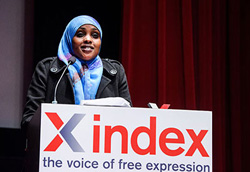
Amran Abdundi (Photo: Alex Brenner for Index on Censorship)
It wasn’t long after women’s rights campaigner Amran Abdundi returned to her native northern Kenya that Al-Shabaab linked terrorists attacked Garissa University College, killing 148 people in a cold-blooded massacre.
Abdundi, who knows many students from the college, immediately joined with other women leaders to organise strong community protests against Al-Shabaab.
“It was a barbaric attack done by a crazy group who have no respect for human life,” she said. “It was a sad day for the people of Kenya and the victims of the attack. But it will not scare [the] people of northern Kenya as we will continue and fight to overcome them”.
Abdundi hopes to help further through her ongoing work with her grassroots community organisation Frontier Indigenous Rights Network, tracking arms movements across the dangerous border with Sudan and travelling to meetings in Nairobi to report observations. “Security is improving now,” says Abdundi.
Winning the Index on Censorship Freedom of Expression Award for Campaigning, and sharing the story of the people of northern Kenya with the wider world, “made me so happy” she says. “The award ceremony was aired by all community radios in northern Kenya and reached many people. I am happy because it will give women courage to stand up for their rights”.
Spending a week in Index on Censorship’s office in London was “an opportunity to see how you work” Abdundi said, and has inspired her to want to develop a new website for her work, helping her to “spread her message to all corner[s] of northern Kenya”.
• Amran Abdundi: This award is for the marginalised women of northern Kenya
• #IndexAwards2015: Campaigning nominee Amran Abdundi
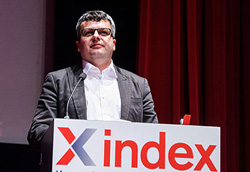
Tamas Bodoky (Photo: Alex Brenner for Index on Censorship)
Atlatszo.hu, Tamas Bodoky’s investigative news website in Hungary has continued to gather praise and acclaim, including another award, the Theodor Heuss Medal.
“All of this recognition is very helpful,” said Bodoky. “We are always afraid of retaliation and this offers us a level of protection… Hungarian authorities are very aware of this international attention and it is less likely that they will attack as we continue with our investigative projects.”
Atlatszo continues to publish three to four articles and numerous blog posts each week, including an English newsletter, often drawing on FOI requests to try to bring more transparency to Hungarian public life.
The campaigning journalists scored a major recent success with their campaign to demand political party foundations make information on their beneficiaries, income and spending publicly available. When political party Jobbik’s foundation refused to comply, Atlatszo took action. It began legal proceedings that proved sufficient to make them capitulate.
Bodoky’s organisation is now using this newly available information to research deeper, exploring “far right networks” and, he says, some curious connections between governing party Fidesz and football club Ferencvarosi TC.
Other recent work “the hammer of the village series” is on local municipalities and the public procurement process, with Bodoky seeking to tackle the “local state capture situation” whereby connections between elected council members and big business are “worrying”. And there are Atlatszo’s ongoing investigations into the spending of European funds. “We have to be a watchdog” says Bodoky.
As he looks ahead, Bodoky is especially concerned by the looming threat of a foreign NGO law – holding all NGO’s with foreign funding “accountable and transparent” by forcing them to register.
“We don’t know exactly when they will seek to expose and limit foreign funding, but the Russian recipe is definitely on the table,” says Bodoky. Fortunately his organisation has been totally open and transparent since 2013.
• atlatszo.hu
• Tamas Bodoky: The independence of journalism in Hungary is under threat
• #IndexAwards2015: Digital activism nominee Tamás Bodoky and Atlatszo.hu
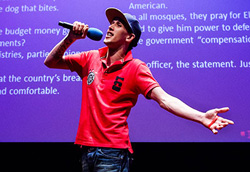
Rapper El Haqed (Photo: Alex Brenner for Index on Censorship)
Rapper Mouad Belghouat, better known as El Haqed (“the enraged” in Arabic) continues to rail against the endemic corruption and widespread poverty he says he sees in Morocco.
Imprisoned three times since 2011, El Haqed was not only prohibited from performing publicly in his homeland but had also been struggling to obtain visas to travel or perform internationally.
The good news is that his visit to the UK has helped him to overcome this obstacle, recently spending five weeks touring Norway, Sweden and Denmark. Highlights included performing live during Oslo’s 1 May celebrations and working with the organisation Freemuse to record a new Fela Kuti cover as part of a group of Arab and Iranian revolutionary artists (listen here). “It was much easier to be there because I went to England and came back,” said Belghouat.
Until recently limited to publishing and sharing his work via YouTube and Facebook, El Haqed has also begun something of an offline resurgence back home. Approached by promoters in his home town of Casablanca after winning the Index on Censorship Freedom of Expression Arts Award brought him widespread local media coverage, El Haqed now hopes to stage his first live concert on home soil in a long time this Friday 19 June. (Update 22 June 2015: Morocco: Police block concert by Index award-winning rapper El Haqed)
“Usually people find many excuses not to work with him,” according to Belghouat’s brother and manager Abderrahim Belghouat, “but so far this time no people have yet come and told the venue ‘don’t work with him’…”
Update 23 June 2015: El Haqed has now cancelled his planned tour of five of Morocco’s least affluent towns. The planned series of concerts would have teamed El Haqed with six other local musicians to “bring joy to poorer people in cities without theatres, cinemas and cultural areas, in the old Moroccan way, by making music for free outdoors”.
El Haqed is determinedly hopeful, “the Index award has shown Moroccan authorities that you can’t stop me,” he said, “the more of an effort they make to silence me, the more my voice arrives everywhere.”
• El Haqed on YouTube
• El Haqed: I will fight for freedom, equality and human rights for ever
• #IndexAwards2015: Arts nominee Mouad “El Haqed” Belghouat
• Index calls on Morocco to release rapper El Haqed
• Index announces winners of 15th annual Freedom of Expression Awards
• Rafael Marques de Morais: I believe in the power of solidarity
• Amran Abdundi: This award is for the marginalised women of northern Kenya
• El Haqed: I will fight for freedom, equality and human rights for ever
• Tamas Bodoky: The independence of journalism in Hungary is under threat
• Special Index Freedom of Expression Award given to persecuted Azerbaijani activists and journalists
• Video: Comedian Shappi Khorsandi hosts Index on Censorship awards
• Drawing pressure: Cartoonists react to threats to free speech
Index on Censorship has condemned the latest extension to the detention of Bahraini human rights activist Nabeel Rajab on spurious charges. He was arrested in early April over comments made on Twitter regarding abuses at Bahrain’s Jaw prison and the crisis in Yemen. On 11 May, Bahraini authorities, who had already extended Rajab’s pre-trial detention several times, prolonged his detention for a further two weeks.
“Bahrain has committed publicly to respecting human rights, but continues to flout its international commitments by denying its citizens the right to peaceful protest, peaceful assembly, and to free expression,” said Index on Censorship CEO Jodie Ginsberg. “We urge the new UK government to use its position as an ally of Bahrain to ensure the country upholds those commitments and ends the harassment of Nabeel Rajab and his fellow democracy activists.”
Earlier this year, Bahrain revoked the citizenship of 72 individuals, including journalists, bloggers, and political and human rights activists, rendering many of them stateless — as part of its latest attempt to crack down on those critical of the government.
Rajab was handed down a six-month suspended sentence pending payment of a fine in January for a tweet that both the ministry of interior and the ministry of defence claimed “denigrated government institutions”.
The tweet in question stated:
many #Bahrain men who joined #terrorism & #ISIS came from security institutions and those institutions were the first ideological incubator
— Nabeel Rajab (@NABEELRAJAB) September 28, 2014
Since then, Rajab’s appeal against the verdict has been postponed repeatedly and he was arrested on 2 April over subsequent tweets and an opinion piece published on the Huffington Post. If he is convicted on all current charges, Rajab could face more than 10 years in prison.
Rajab is a former winner of a Index on Censorship freedom of expression award, president of the Bahrain Center for Human Rights and a member of Human Rights Watch’s Middle East Advisory Board. He has continuously been targeted by Bahraini authorities over his human rights campaigning work. He was released in May 2014 after spending two years in prison on spurious charges including writing offensive tweets and taking part in illegal protests.
Last month, Rajab’s civil society colleagues human rights defender Abdulhadi Al-Khawaja and political activist Salah Al-Khawaja were prevented from attending the funeral of their eldest brother Abdulaziz, who passed away in Bahrain. Abdulhadi is serving a life sentence due to his human rights work and Salah is serving five years for his political activism; both are prisoners of conscience and torture survivors.
This article was posted on 11 May 2015 at indexoncensorship.org